- Offensive Techniques & Strategies
"Stack" Zone Offense
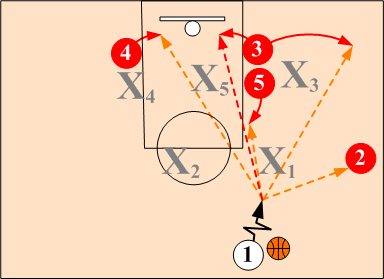
What to Discover or Recall . . .
Stack is a very prolific zone offense based on the overload principle.
In fact, it can be so effective that most teams will not zone against it.
It is a simple offense to teach and easy to master since the stack alignment, immediately, creates match up and adjustment problems for any zone.
Like all successful offenses, the Stack Offense incorporates precise spacing and movement.The stack overload alignment, immediately, creates match up and adjustment problems for any zone. In addition, since players have specific roles and responsibilities with in the offense, it allows them concentrate and master a single or closely related roles rather than having to learn multiple positions and assignments. When a zone does match up, the stack offense can quickly flop sides and attack the weakside of the zone. It is flexible in that it has a multiple entries and "Crunch" time specials that can be deployed as the shot or game clock runs down.
Offensive rebounding is another major strength of the Stack Zone Offense. On many of occasions, missed shots will actually end up being great passes for put backs and rebound shots. Offensive rebounding and second efforts are vital to the outcome of any game. Although, stack alignments and overloads have been around for sometime, Mike Frink was instrumental in introducing this particular continuity.
| Basics | Post Attack | Entries | Specials |
Offensive Fundamentals Required
 Attacking Zone Defense Principles
Attacking Zone Defense Principles Zone Offense - Reads & Counters
Zone Offense - Reads & Counters

Basic Actions
The stack alignment and continuity provides for specific player roles and responsibilities allowing players to do what they do best and play within their strengths and limitations. Shooters shoot and rebounders rebound. However, during a game, coaches do need to be cognizant of the areas on the court where open shots are occurring, and deploy their best shooters to those areas.
| Roles & Responsibilities | Overload Reads | Pass & Cut Action | Ball Reversals | Continuity |
Player Alignment & Responsibilities
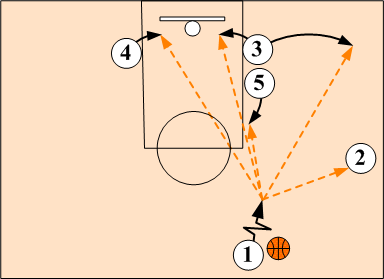

Point GuardQuarterback and leader. Responsible to direct offense. Must have a working knowledge of how to read & attack defenses. Must be able to hit open shot at top of circle. Defensively responsible of denying opponent's playmaker the ball.

Shooting GuardBest three point shooter on squad. Must be able to hit outside shot from both wings. Interchangeable with the #3 spot. Defensively has basket responsibility.

Small ForwardMost active front line player or third guard. Low angle (baseline) or corner shooter. Offensive rebounder with nose for the ball. Interchangeable with #2.

Power ForwardPower forward, must be able to shoot and feed from high post area. Sets up on right block, but must operate both from low and high post positions. Interchangeable with #5. Must rebound offensively.

PostPost, best inside rebounder. Sets up on left block, but must operate both from low and high post positions. Must be able to shoot and feed from high post area. Interchangeable with #4.
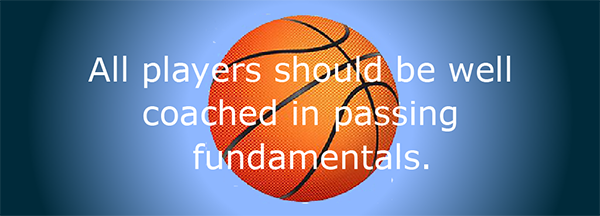

Phase 1: Basic Overload Reads
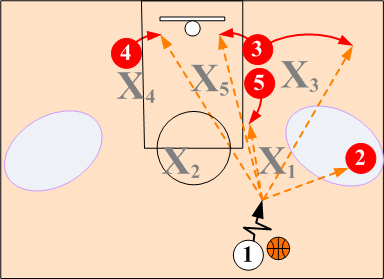
Point O1 attacks defender X1 on strong side elbow with dribble. Shooting guard O2 assumes a spot up shooting position on wing anticipating pass from O1. If/when X3 challenges shot, O2 can pass to O5 or O3. Baseline runner O3 creates lead along baseline or rebounds when a shot is taken. Post O4 seals off defender X4 and looks for the "X" (skip) pass from either O1 or O2. O4 rebounds boxes out and rebounds weakside on all shots. O5 posts up strong looking for a direct pass from O1. If contested, O5 has drop pass options to O4 or O3. O5 goes to weakside boards if/when shot occurs.
Basic Looks and Reads
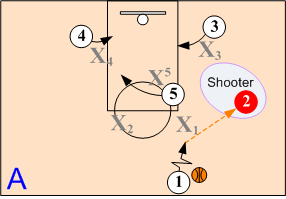
Point O1 draws defender X1 and looks to feed shooter O2 spotting up on wing.
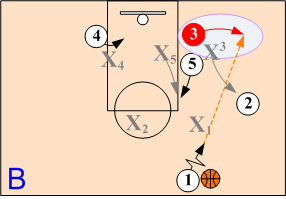
When defender X3 matches up and closes out to shooter O2 on wing, O1 looks to pass to open O3 on baseline.
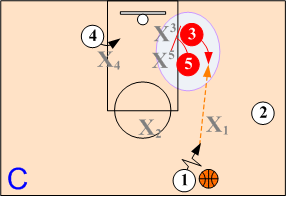
When defender X3 plays to the inside of O3 on stack, O5 sets a down screen and O3 pops out for short jumper or bank shot.
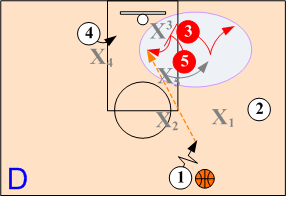
When defense switches O5's screen, O1 or O3 look to feed O5 posting up inside against smaller x3.
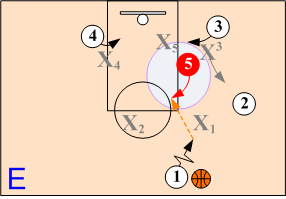
When defender X5 plays low on stack, O5 flashes into middle looking for shot.
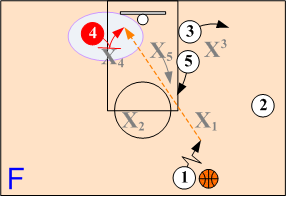
O4 seals off defender X4 looking for the "X" (skip) pass from O1 or rebound.

Phase 2: Pass & Cut Action
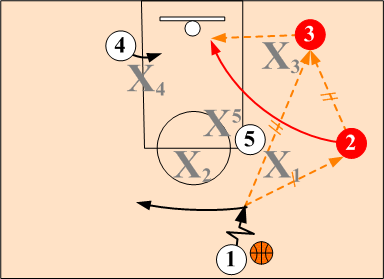
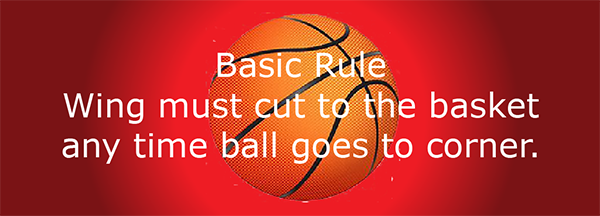
Point O1 passes to O2 and moves to opposite side of court as O5 moves up lane to side post position facing the basket. When O2 (or O1 passes) to O3 on baseline, O2 makes a basket cut looking for a return pass from O3. When O3 receives pass from O2, O3 looks for shot, or to O2 cutting to basket Note: missed shot should result in good pass to O4. O5 looks for pass from O3 or rebounds weakside if shot is taken.
Basic Reads & Counters:
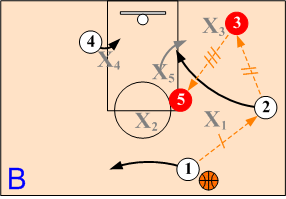
When defender X5 drops down to defend O2's basket cut, O3 looks to pass to open O5.
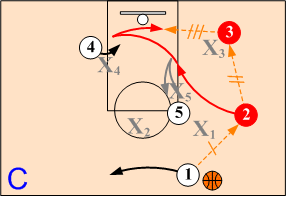
Normally when cutter O2 does not receive a pass from O3, O2 continues out and spots up on weakside wing. However, O2 may double back at any time when X5 closes out to O5 on high post leaving the baseline area open.
Phase 3. High Post Roll
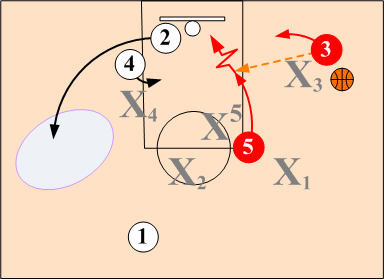
After cutter O2 clears out to weakside wing, O5 rolls down lane looking for pass from O3. If/when O5 receives the ball, O5 first looks to shoot and then to drop pass to either O3 or O4 when the defensive sags off to help on roll. O5 also has option of making a skip pass out to O2 or O1 on weakside for three point shots.
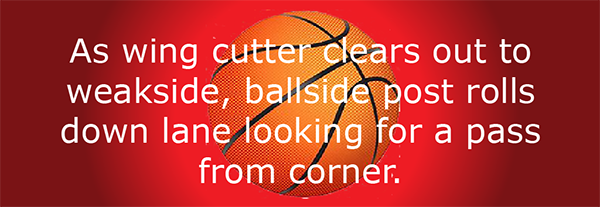
Side Post Feed
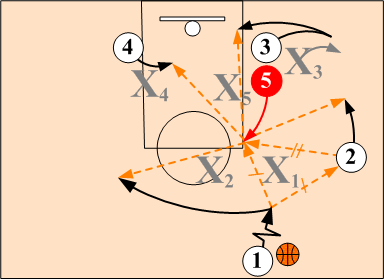
Read: Weakside Post Defender X4 plays up.
Point O1 moves to weakside. Shooter O2 moves toward corner and should be wide open if/when X3 follows O3 on baseline cut. O3 cuts along baseline into gap looking for feed from post O5. If weakside low post defense X4 plays high, post O4 boxes out X4 anticipating a pass or offensive rebound. Post O5 flash to side post receiving the ball facing the basket looking first for shot and then pass (four options).
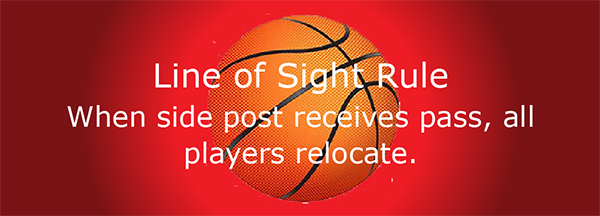
Weakside Post Attack
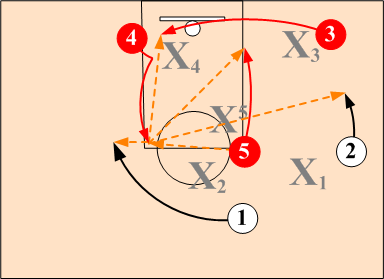
Read: Side Post Defender X4 plays low.
If/when defense X4 plays low, O4 breaks up to side post looking for pass from O5. O4 looks for shot then pass. When O4 receives ball O1 cuts off O4 for two person game. Shooter O2 moves toward corner and should be wide open if X3 follows O3 on baseline cut. O3 cuts along baseline into gap looking for feed from post O4 (or O5). O5 passes to O4 and cuts to basket looking for return pass from O4 or rebound.
Automatic Skip Pass
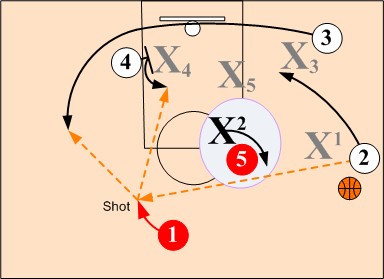
Read: High Post Pass Denial.
When defender X2 denies pass to high post O5, O2 looks to make a reversal pass to out to open O1. O4 screens defender as O3 cuts to baseline to opposite wing. O1 has options of shooting, passing to O3 coming off O4's base screen or feeding O4 if defender X4 chases out to O3. After making the reversal pass, O2 cuts baseline to opposite corner to re-establish the basic overload.

Phase 4: Ball Reversal
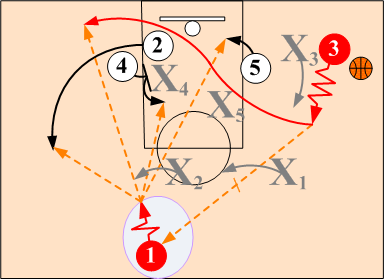
When O3 cannot feed O2 or O5, O3 makes a reversal pass out to O1, and cuts along baseline to create overload on opposite side. O1 then attacks X2. O2 spots up for wing shot coming off O4's base screen. O3 creates lead along baseline or rebounds if/when a shot occurs. O4 screens for O2 and then posts up in low post area. If/when O4 does not receive ball, O4 assumes a side post position. O5 looks for cross court "X" pass or rebounds weakside.
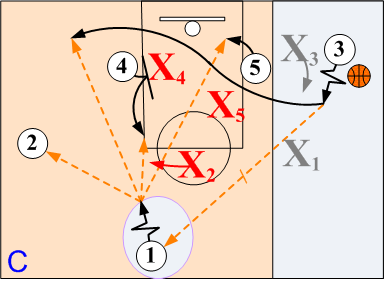
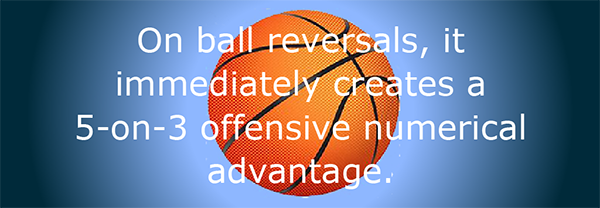
Automatic Skip Pass
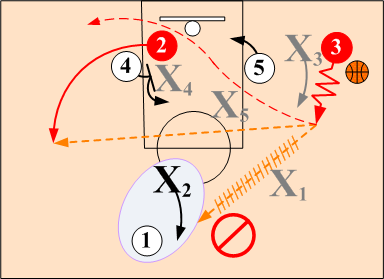
Read: Defense overplays and denies reversal pass to O1.
When defender X2 denies O3's reversal pass out to O1. O3 automatically looks to make a skip pass to O2 on wing coming off O4's weakside down screen. After making the skip pass, O3 makes a baseline cut to opposite corner to re-establishing an overload.

Continuity Left
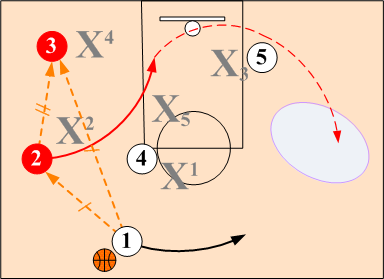
Repeat Pass and Cut Action
Point O1 passes to O2 and moves to opposite side of court. O2 shoots the ball if unguarded. If/when O2 (or O1 passes) to O3 on baseline, O2 makes a basket cut looking for a return pass from O3. If/when O3 receives pass from O2, O3 looks for shot, or to O2 cutting to basket or to O4 at side post if X4 drops to defend O2's cut. O4 moves up lane to side post position facing basket. O4 looks for pass from O3 or rebounds weakside if shot is taken. O5 boxes out and rebounds on weakside.
Note: missed shot should result in good pass to O5.

Optional Entries
Flop Entry Option
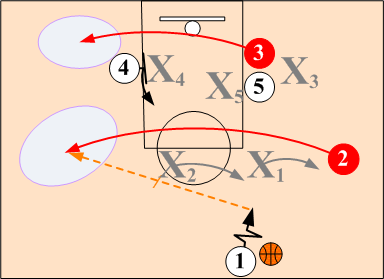
READ: Defender X1 matches up on shooter O2.
When defender X1 matches up with wing O2, O2 breaks directly across to opposite wing. O3 reads O2's cut and moves along baseline to opposite side. O4 first posts up on low and then breaks up to a side post position. O5 drops down looking for the "X" (Skip) pass from O2 or rebound. O1 passes to O2 after breaking across to opposite wing to initiate offense.
Exchange Entry Option
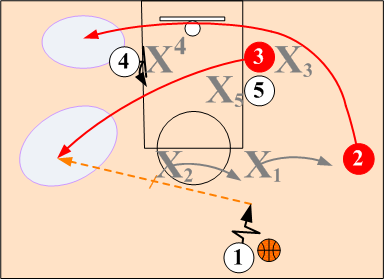
READ: Defender X1 matches up on shooter O2.
Point O1 attacks strong side elbow, and passes to O3 breaking out to weakside wing. O2 exchanges positions with O3 and cuts to opposite baseline. O4 first posts up low and then breaks up to a side post position. O5 drops down looking for the "X" (Skip) pass from O2 or rebound.

Triple Stack Alignment
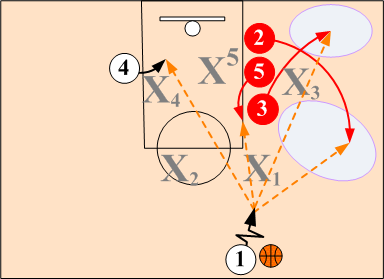
The Triple Stack alignments creates match up problems for the defense since they cannot predetermine who will be assuming the wing position. The triple stack alignment is a contribution by Tom Newell. He used it very successfully while coaching professionally in Greece and with Japan's Mens National Team. Basically, O3 reads O2's action and breaks opposite. When O2 breaks out to wing, O3 assumes the short corner position while O5 flashes to middle.
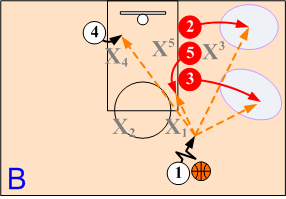
O3 Goes Opposite of O2
When O2 steps out to the short corner, O3 breaks out to the wing position and O5 flashes to middle.
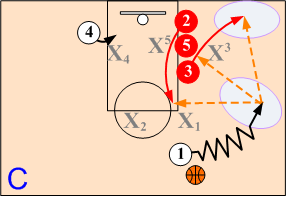
Dribble Entry
When O1 penetrates to wing on dribble, O2 pops up to elbow and O3 moves to short corner. O1 assumes the wing position and looks to pass to O2, O3 or O5 posting up.
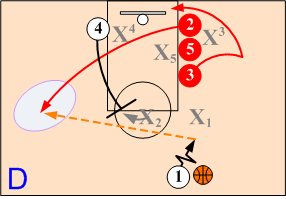
Weakside Flop Attack
Ballhandler O1 passes to shooter O2 breaking out to opposite wing off O4's high post back screen. O3 cuts to opposite short corner. O5 drops for "X" pass or rebound.
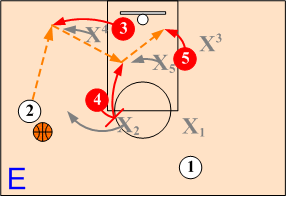
Post Roll
When defender X2 gets around O4's screen, O2 looks to feed O3 in short corner area for shot as O4 rolls to basket after setting screen. If defender X4 steps out to guard O3, O3 looks to feed O4 rolling to basket. If defender X5 should sag off to help out against O4 roll, O4 can make a drop pass to open O5.

Crunch Time Specials
These "Crunch Time" specials can be ran as the shot or game clock runs down or after a time out or verbal call.
"Vegas" - Double Away
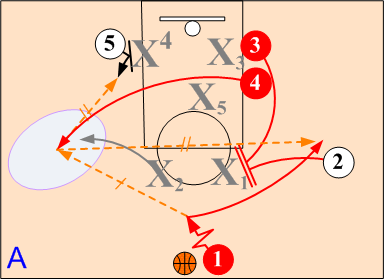
Double Screen Away
Point O1 passes to O4 breaking out to wing on weakside. O1 then goes opposite off double screen for shot off return skip pass from O4. O2 and O3 set a double screen at weakside elbow for O1. O5 posts up hard. When O4 skip passes to O1, O4 and O5 establish inside rebounding positions.
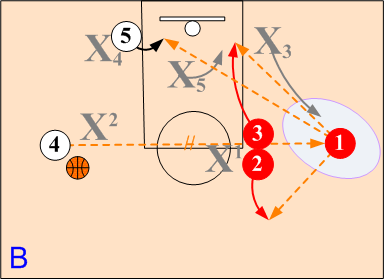
Double Screen Options
If open O1 shoots the ball; however, when defender X3 rushes out to challenge the shot, O1 has option of feeding O3 on post roll or "X" pass to O5 when X5 defends against O3's roll. When defender X1 takes O1, O1 looks to pass to O2 stepping out for shot. O4 and O5 anticipate a miss shot and rebound.
Note: a missed shot should end up as a good pass.
"Back" - Weakside Lob
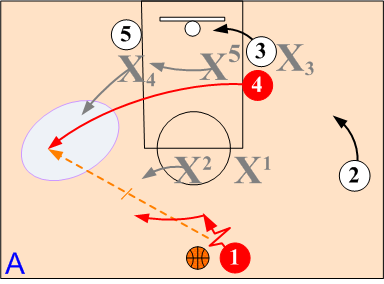
Weakside Entry
O4 and O5 interchange positions on lob. O1 passes to O4 breaking out to wing on weakside. O1 then creates lead for a return pass from O4. O4 looks to feed O5 posting up.
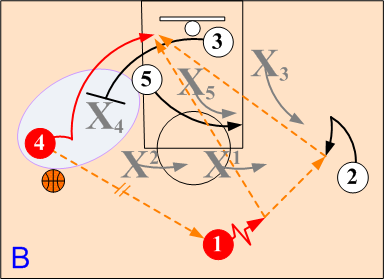
Wing Lob Option
O4 makes a reversal pass back to O1, and cuts off O3's back screen. O1 passes to O2 or lobs directly to O4 off dribble. When O2 receives pass from O, O2 can feed O4 on lob or pass to O5 flashing into the middle who in turn lobs to O4. O3 must set a strong back screen for O4 on weakside. If the lob pass is not available go directly into basic Stack overload action.
"Cat" - Attacking the Double Team
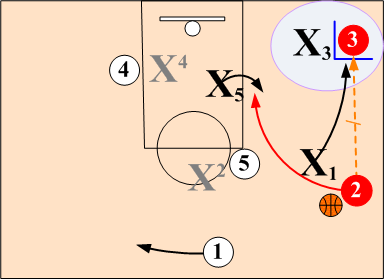
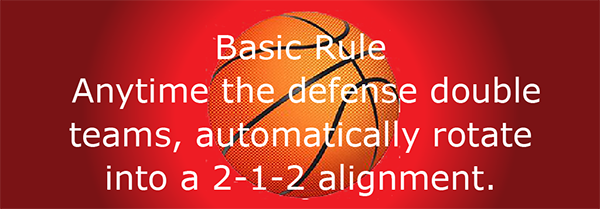
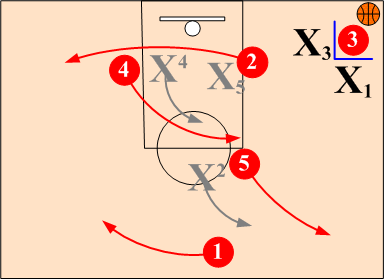
Immediately, rotate into a 2-1-2 alignment and move the ball with sharp, accurate passes (no dribbling). The "Cat" or 2-1-2 alignment is a simple, but very successful offense to deploy when the defense traps or double teams. When defenders X3 and X1 double team O3 in corner, O5 pops out and O4 flashes into the middle.
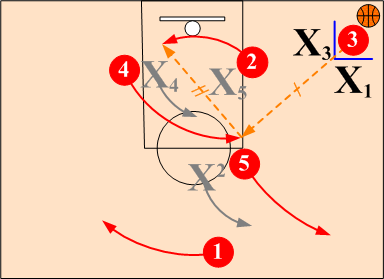
O3 looks first to feed O4 flashing into the middle and then to make a kick out pass to O5 or O1.
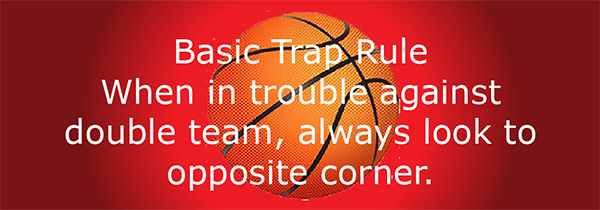
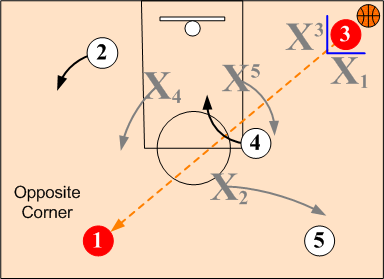
Pass Out of Trap
When the defense locks up O3 in a "Hard" double team and denies the passing lanes to O2, O4 and O5, O1 should look immediately to make a strong pass out to open O1 in opposite corner of the floor.
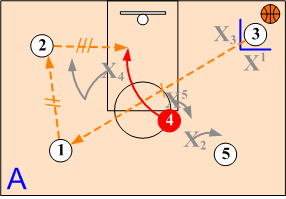
Post Roll Rule
Anytime the ball is passed to a baseline corner, the post rolls to the basket.
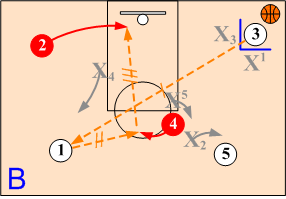
Back Cut Rule
When the ball is entered into the middle, the baseline corners back cut to the basket.
Return to Zone Offenses - Click Here
Return to Offensive Strategies - Click Here
Return to HoopTactics - Click Here
© 2026 HoopTactics All Rights Reserved.
